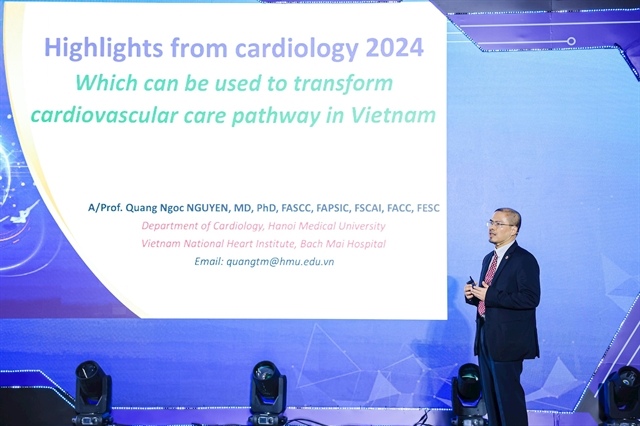Experts share innovations in treating cardiovascular disease and stroke
Society – Economy - Ngày đăng : 10:54, 06/12/2024
 |
| A panel discussion at the symposium, entitled Innovations in Transforming Cardiovascular Health and Stroke Outcomes, in Hà Nội on December 5. — Photo courtesy of the organiser |
HÀ NỘI — Domestic and international scientists and medical experts discussed new solutions in treating cardiovascular disease and stroke - the two leading causes of death in the world - at a symposium on December 5.
The forum, entitled 'Innovations in Transforming Cardiovascular Health and Stroke Outcomes', is the last event of the series of Science for Life symposia within the framework of the 2024 VinFuture Sci-Tech Week in Hà Nội.
Experts said that cardiovascular diseases are the leading cause of death globally. In 2021, cardiovascular diseases claimed 20.5 million lives, accounting for nearly one-third of all deaths. Of these, 85 per cent were due to heart attacks and strokes, while more than 80 per cent of deaths from cardiovascular diseases occur in low and middle-income countries.
 |
| Professor Valery Feigin, Auckland University of Technology, New Zealand, speaks at the symposium. — Photo courtesy of the organiser |
Professor Valery Feigin, from the Auckland University of Technology in New Zealand, said that more than 70 per cent of strokes are related to blood pressure. In the last 10 years, the incidence and prevalence of stroke have increased again while expensive treatment costs create an economic burden, especially in lower-income countries.
“Việt Nam is the country with the highest stroke rate globally, which is four times higher than New Zealand. On average globally, one in four people has a stroke. This ratio in Việt Nam is three-one. Of which 53 per cent of people with stroke are under the age of 70.”
Associate Prof. Mai Duy Tôn, Director of the Stroke Centre at Bạch Mai General Hospital in Hà Nội, said that Việt Nam reports more than 2,000 new stroke cases each year, while the number of deaths within 90 days is about 10 per cent.
“Strokes in Việt Nam not only tend to increase the mortality rate but are increasingly occurring in younger people,” stressed the professor.
 |
| Prof. Alta Schutte, University of New South Wales, Australia, member of the VinFuture Preliminary Council, speaks at the symposium. — Photo courtesy of the organiser |
Prof. Alta Schutte, of the University of New South Wales, Australia and a member of the VinFuture Preliminary Council, said that controlling blood pressure is the root factor in preventing stroke. Statistics show that more than 70 per cent of strokes are related to high blood pressure.
However, Schutte said: " Only about 23 per cent of women and 18 per cent of men in the world have their blood pressure effectively controlled. Among them, low- and middle-income countries, including Việt Nam, face this alarming rate.”
She also said that delays in treatment or non-compliance with treatment regimens are major challenges. The main causes are a lack of patient awareness, inaccurate blood pressure measurement procedures and the implementation of complex treatment regimens. These challenges require innovative solutions, from improving blood pressure measuring equipment to developing more convenient treatments.
Prof. Schutte said that prevention of cardiovascular disease depends on controlling key risk factors, including smoking, an unhealthy diet, lack of exercise, alcohol abuse and air pollution. It is important to detect cardiovascular disease as early as possible so that treatment can begin with counselling and medication.
Progressive intervention solutions such as using combination pills, medical care, using potassium-rich salt are creating positive changes in cardiovascular health care and stroke treatment. Digital transformation in the health sector also helps expand the capacity for care, prevention and early diagnosis, especially in areas with limited resources, she said.
Professor Schutte also added that advanced technologies such as artificial intelligence are and will play an important role in stroke prevention and treatment solutions. This can also become a solution for everyone, including people with low and medium incomes, to access information, raise awareness and receive comprehensive health care.
 |
| Associate Prof. Nguyễn Ngọc Quang, Deputy Director of the National Heart Institute, Bạch Mai Hospital, speaks at the symposium. — Photo courtesy of the organiser |
Associate Prof. Nguyễn Ngọc Quang, Deputy Director of the National Heart Institute, Bạch Mai Hospital, said that factors such as air pollution, high smoking rates and unhealthy diet are the main causes of the high stroke rates in Việt Nam.
Quang said that the burden of cardiovascular disease is a global problem and needs to be addressed comprehensively. He also proposed a comprehensive treatment model that combines many specialities, from medical care at the hospital to psychological support and rehabilitation at home.
“Artificial intelligence (AI) application solutions in diagnosis and treatment are opening up many new opportunities to improve treatment quality in Việt Nam. Many new treatment methods, applying new technology as well as new drugs for blood pressure, have helped increase patient life expectancy by at least six years,” said Prof. Quang.
Prof. Tôn also shared plans to reduce stroke rates in Việt Nam in the next five years, including raising public awareness, improving treatment regimens and enhancing coordination between medical specialisms. — VNS
